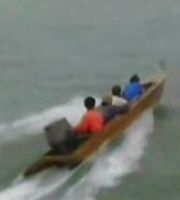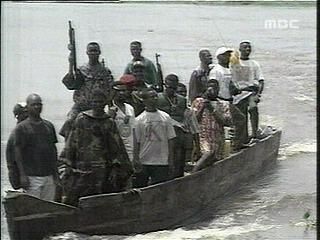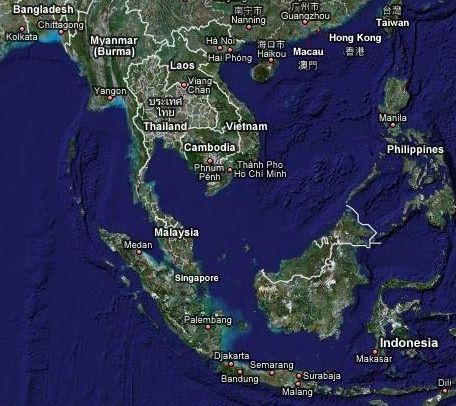
Publisher:
Bonnie King
CONTACT:
Newsroom@Salem-news.com
Advertising:
Adsales@Salem-news.com

~Truth~
~Justice~
~Peace~
TJP
Jan-15-2008 00:11

 TweetFollow @OregonNews
TweetFollow @OregonNews
What About Real Bloodthirsty Pirates? (VIDEO)
Tim King Salem-News.comTerrorism on the high seas can come in the form of pirates, known today for fast boats, big guns and bad motives.
 Photos courtesy:Cruising-Asia.com and maritimeasia.blogspot.com/ |
(SALEM, Ore.) - Pirates along the Southeast Asia coastline murder, rape and pillage the vessels of tourists and refugees on a regular basis, and the problems have escalated in recent years with the advancement of boats and weaponry that allow these criminals of the sea to easily overpower and lay siege to innocent people.
 These Indonesian officials are |
I think about all the important things in the world that are being overlooked and passed by. These things that exist in the midst of our troubled world like piracy miss the radar all the time, and they are heinous and despicable.
You have to wonder why Hollywood portrays pirates in a glamorous sense, because there is no glamor in what these men do. But then Hollywood is who brought you Fay Dunaway and Warren Beatty as Bonnie and Clyde. I mean I liked the movie, but they completely glamorized two cold blooded murderers and made America feel sorry for them.
Over the years thousands of refugees were killed, clubbed, raped and robbed by modern day pirates operating boats with powerful engines. In the early 80's one survivor was reported saying, "It's a horrible, appalling situation, one of the most violent acts against people seeking asylum in history."
In the 1970's when the first mass exodus of Vietnamese took place, hundreds of refugees set out on the ocean in flimsy boats. Reuters reported in 1983 that of 450 vessels that landed in Thailand and Malaysia in a four month period, 200 had been attacked by pirates.
Fighting pirates
I first became acquainted with the fact that modern piracy is an ongoing problem a few years after that Reuters article was published. A close friend of mine named Osotan, was actually hired to crew a vessel with a mission to fight pirates off the coast of Thailand. As it turned out though, the vessel's role as a pirate fighter was an apparent ruse.
 Piracy is not just a problem off the Asian coast; |
The tired vessel finally came to rest on a mud shelf, Osotan said, "which effectively stopped the leaks and had us at a twenty five or thirty degree list as we waited for the owner to arrive and authorize funds to repair it, which they accomplished there, pumping out the engine room and righting the vessel, but it was still not seaworthy."
He says an American named Colonel Jack Baily was the ship's owner. He passed away in the ensuing years. Osotan says he was embroiled in several accusations of fraudulent activities to raise money for "Operation Rescue" as it was named. As it turned out the crew never fought any pirates.
"The owner eventually sold it to one of Kirk Douglas's sons who was a film producer and wanted it for one of his movies. I didn't pursue it after I split off the project so to speak and went out on my own."
I remember how odd that seemed; that when people were dying on the high seas at the receiving end of pirate's bullets and knife blades, we were sitting under a tree in a nation full of people who believed the last pirates died out around the time of the civil war.
Osotan says reports of piracy from the Straits of Mallaca and Indonesia are frequent today. He added along other parts of the Thai coast there are limited problems, but he fears that if pirates began operating there they would be seeing a fair amount of booty, "Near my area no problem as of yet but if I was a pirate it would be a profitable, mostly unprotected route, lots of tourist boats and virtual plums for the picking," he said.
Boiling it down
Salem-News.com contributing writer OOH Keat Gin, is an associate professor and coordinator of the Asia-Pacific Research Unit (APRU) in the School of Humanities, Universiti Sains Malaysia, Penang, Malaysia. He is an expert on Asian political affairs. Salem-News asked the professor what the primary motivations are behind the piracy.
"My take on piracy in Southeast Asia is partly necessity and partly greed. Piracy in the region has a long legacy."
I was interested in learning that this was not a new phenomena that began during the waining years of our war in Vietnam, but something sailors along this coast have been doing for a long time. The professor said, "Inhabitants across the region at times view raiding on the sea as not a crime or atrocity but as adventure or coming of age or some bravado act."
He explains that apart from the socio-cultural aspects of piracy that brought forth much controversy, there is the political angle.
"Western imperialists and colonialists used the term ‘pirates’ and ‘piracy’ to justify their own incursions into the region; defeating indigenous opposition to Western entry into the market and land was cloaked under the guise of defeating blood thirsty pirates."
Historical accounts of various acts of piracy by western nations make popular folklore and recent movies and the attraction at Disneyland seem like a great thing to share with the kids. Peter Pan further immortalized the notion of pirates being unruly but acceptable characters. OOH Keat Gin discusses various components of the history of piracy, none of which are rosy tales.
"Many eyewitness accounts and documentation showed that there were indeed pirates in the East Indies (archipelago Southeast Asia) as there were in the West Indies; those who plunder, rape, and kill for spoils. Then there were the raiding parties off the Borneo coasts and in the Sulu Sea of head-hunting pirates and raiders who were dubbed ‘fishermen of men’ (slave raiders). Scholars have argued that economic dislocation in indigenous markets consequent of Western encroachment forced many local inhabitants into piratical activities, initially as a means to combat or strike at the foreign incursions but more often to seek other forms of activities for enrichment."
With regard to the contemporary situation in Thailand and Vietnam, Gin says it is also a consequence of necessity as well as plain greed.
Thailand
In spite of the fact that Bangkok has played witness to a good amount of economic development in recent years, there are many areas that have not been fortunate to partake of the economic pie, Gin says.

"Poverty and the struggle to make ends meet continue to be rife in many outer provinces outside the Central Plains; the Malay-Muslim southern provinces and Korat are but two areas where economic prosperity and infrastructure developments are a long way to be attained, he said"
He says it therefore should be no surprise that those living in coastal regions turn to piracy as a means of scratching out a living.
"Smugglers and pirates worked hand in hand with corrupt officialdom to create opportunities amongst themselves." Gin says that while it was initially borne of necessity, piracy gradually transformed into greed as successful raids led to further attacks on trading vessels plying the Gulf of Siam, a body of water that like the South China Sea, is too big to be constantly patrolled or monitored by security forces.
Vietnam
In the Vietnamese context of this story, Gin says the road to capitalism opens up many opportunities to be materially comfortable for a nation. Vietnamese are sometimes tempted by the rewards of what we Americans might call a fast buck.
"Despite harsh penalties for criminal acts, there are those who are willing to break the law as the returns from criminality are too lucrative to abandon. All human activities are a gamble. And as gamblers, whether at the pool table or of a round of poker, all know that the bigger the commitment of funds, the greater the risk but the greater the returns."
The rush to attain wealth can be a particular he says, amongst the southerners, which before 1975 was a haven of capitalism. According to Gin, this need to live at a higher level undoubtedly caused some Vietnamese to turn to the sea in seeking their fortune.
"Investment in fast boats, the best engines money can buy, AK-47s, and even small cannons or rocket launchers are but part of a business enterprise. Rape, plunder or other atrocities are commonplace amongst piratical circles."
The professor says one solution would involve Thailand, Cambodia, Vietnam, Malaysia and Singapore jointly sharing out the cost and manpower in policing the waters that they all share. He believes that respective governments need to come down hard on their corrupt officials and that all of them who stray from legal bounds, from the big fish to the smaller fries, "all need to be hauled up and punished."
He suggests that in reality, as long as there are rich opportunities of trading vessels plying the open sea there will be raiders awaiting to cash in on such valuable cargoes. This video courtesy of YouTube examines the plight of Indonesian government in combating piracy along their nation's coastline.
 Tim King is a former U.S. Marine with almost twenty years experience on the west coast as a television news producer, photojournalist and reporter. Today, in addition to his role as a war correspondent in Afghanistan where he spent the winter of 2006/07, this Los Angeles native serves as Salem-News.com's Executive News Editor. Salem-News.com is the nation's only truly independent high traffic news Website, affiliated only with Google News. You can send Tim an email at this address: newsroom@salem-news.com
Tim King is a former U.S. Marine with almost twenty years experience on the west coast as a television news producer, photojournalist and reporter. Today, in addition to his role as a war correspondent in Afghanistan where he spent the winter of 2006/07, this Los Angeles native serves as Salem-News.com's Executive News Editor. Salem-News.com is the nation's only truly independent high traffic news Website, affiliated only with Google News. You can send Tim an email at this address: newsroom@salem-news.com
Articles for January 14, 2008 | Articles for January 15, 2008 | Articles for January 16, 2008
Salem-News.com:


Quick Links
DINING
Willamette UniversityGoudy Commons Cafe
Dine on the Queen
Willamette Queen Sternwheeler
MUST SEE SALEM
Oregon Capitol ToursCapitol History Gateway
Willamette River Ride
Willamette Queen Sternwheeler
Historic Home Tours:
Deepwood Museum
The Bush House
Gaiety Hollow Garden
AUCTIONS - APPRAISALS
Auction Masters & AppraisalsCONSTRUCTION SERVICES
Roofing and ContractingSheridan, Ore.
ONLINE SHOPPING
Special Occasion DressesAdvertise with Salem-News
Contact:AdSales@Salem-News.com


Terms of Service | Privacy Policy
All comments and messages are approved by people and self promotional links or unacceptable comments are denied.
[Return to Top]
©2026 Salem-News.com. All opinions expressed in this article are those of the author and do not necessarily reflect those of Salem-News.com.